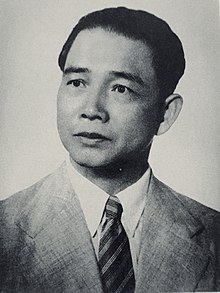Wang Jingwei
Chinese politician (1883–1944) / From Wikipedia, the free encyclopedia
Dear Wikiwand AI, let's keep it short by simply answering these key questions:
Can you list the top facts and stats about Wang Jingwei?
Summarize this article for a 10 years old
Wang Zhaoming,[lower-alpha 1] widely known by his pen name Wang Jingwei[lower-alpha 2] (4 May 1883 – 10 November 1944), was a Chinese politician who was president of the Reorganized National Government of the Republic of China, a puppet state of Japan. He was initially a member of the left wing of the Kuomintang, leading a government in Wuhan in opposition to the right-wing government in Nanjing, but later became increasingly anti-communist after his efforts to collaborate with the Chinese Communist Party ended in political failure.
Wang Jingwei | |
|---|---|
汪精衞 | |
 | |
| 1st President of the Republic of China President of Executive Yuan (Reorganized National Government) | |
| In office 20 March 1940 – 10 November 1944 | |
| Vice President | Zhou Fohai |
| Preceded by | Office established |
| Succeeded by | Chen Gongbo |
| Premier of the Republic of China | |
| In office 28 January 1932 – 1 December 1935 | |
| President | Lin Sen |
| Preceded by | Sun Fo |
| Succeeded by | Chiang Kai-shek |
| Personal details | |
| Born | (1883-05-04)4 May 1883 Sanshui, Canton, Qing Empire (now Sanshui District, Foshan, Guangdong, China) |
| Died | 10 November 1944(1944-11-10) (aged 61) Nagoya, Empire of Japan |
| Political party | Kuomintang Kuomintang-Nanjing |
| Spouse | Chen Bijun |
| Military service | |
| Branch/service | Peacebuilding National Army |
| Years of service | 1940–1944 |
| Rank | Generalissimo (特級上將) |
| Battles/wars | Second Sino-Japanese War |
| Wang Jingwei | |||||||||||||||
|---|---|---|---|---|---|---|---|---|---|---|---|---|---|---|---|
| Traditional Chinese | 汪精衞 | ||||||||||||||
| Simplified Chinese | 汪精卫 | ||||||||||||||
| Literal meaning | (pen name) | ||||||||||||||
| |||||||||||||||
| Wang Zhaoming | |||||||||||||||
| Traditional Chinese | 汪兆銘 | ||||||||||||||
| Simplified Chinese | 汪兆铭 | ||||||||||||||
| Literal meaning | (birth name) | ||||||||||||||
| |||||||||||||||
Wang was a close associate of Sun Yat-sen for the last twenty years of Sun's life. After Sun's death in 1925 Wang engaged in a political struggle with Chiang Kai-shek for control over the Kuomintang, but lost. Wang remained inside the Kuomintang, but continued to have disagreements with Chiang until the outbreak of the Second Sino-Japanese War in 1937, after which he accepted an invitation from the Japanese Empire to form a Japanese-supported collaborationist government in Nanking. Wang served as the head of state for this Japanese puppet government until he died, shortly before the end of World War II. His legacy remains controversial among historians. Although he is still regarded as an important contributor in the Xinhai Revolution, his collaboration with Imperial Japan is a subject of academic debate,[1][2] and the typical narratives[among whom?] often regard him as a traitor in the War of Resistance with his name becoming synonymous with treason.[3][4]